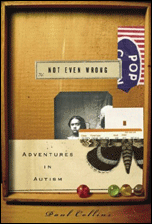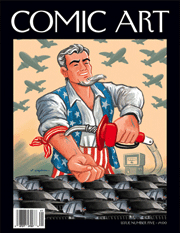Five years ago (!!), I wrote this (fictional) article about entering Steve Malkmus’ conciousness, ala ‘Being John Malkovich.’ A few days ago I found this site, where someone has translated it into Japanese. Totally weird.
Month: April 2004
A Perfect Circle – ‘Diary of a Lovesong’
From: Live MP3 (2000)
I’d forgotten this combination of Ozzy’s ‘Diary of a Madman’ (verses) and The Cure’s ‘Lovesong’ (chorus) even existed until I found it on an old CD full of mp3’s. As you’ll recall from my 2003 Xmas mix, I’m a sucker for songs that are melded together. This is a live version – I’m pretty sure they never recorded this, but I could be wrong. See if you can pick out the tasteful improvisation that replaces the line ‘Diary of a Madman.’
I recently finished reading ‘Not Even Wrong: Adventures in Autism,’ the latest book from former McSweeney’s contributor and Collins Library figurehead Paul Collins. ‘Not Even Wrong’ is a perfect melding of the styles of his previous two efforts – ‘Banvard’s Folly,’ which profiled thirteen forgotten scientists, inventors, and tinkerers in rich historical context; and ‘Sixpence House,’ an autobiographical work detailing Collins’ move to Hay-on-Wye, a town in England known for its booktrade-driven economy.
‘Not Even Wrong’ is another autobiographical work – the central narrative is the story of Collins and his wife dealing with the revelation that their son is autistic. Woven into the firsthand account of their slow adjustment to this situation are meticulously researched essays on a handful of topics related to the disease and its history. While ‘Sixpence House’ also frequently departed from its narrative to follow tangents presented by the wealth of printed matter on hand in Hay-on-Wye, similar departures are much more closely related to the central narrative in ‘Not even Wrong.’ Collins paints an engaging historical portrait of autism, exploring the possible connection to feral children, the scandalous evolution of treatment, and the link between the disease and isolationist pursuits (Mathematics, fine art) – touching on the fact that an impressive percentage of fathers of autistic children are… engineers. Highly Recommended. Woo.
Also: Uncollected Paul Collins.
In the past few years I’ve read in a number of places that Robin Williams is a flagrant comedy thief. What I’ve never come across are specific incidents of this occurring. So I decided to delve into the vast resource of usenet’s standup comedy newsgroups and see what I could dig up. Among the many permutations of ‘If Robin Williams is stealing your material, you’ve got bigger problems,’ I found lots of hearsay and references to a specific incidents, but none of the primary source information that I crave. I collect the ‘highlights’ here in the hopes that someone with more specifics (or better googling skills) will find this and get in touch with the details. Without further ado, the hearsay:
“One of the things that I’ve learned from doing standup comedy is that Robin Williams steals jokes. That’s the worst fucking thing any comic could ever do to another comic. His joke stealing is so well-known that whenever he steps in a club, any experienced comedian ends their set immediately.”
…
“My hatred for Mr. Williams goes back to my days in the mid-80s doing stand-up comedy. At the time, Robin was a big star in stand-up. But every big-time comedian that I worked with said the same thing about him … he was a comedy thief and everyone in comedy hated him. It was common knowledge that he would frequent comedy clubs, sit in the back and write down all the jokes that guys used that got laughs. Then he’d present them as his own “wacky improvisations” on television and garner all these accolades as being a comedy genius when NONE of his material was original, it was a hodgepodge of various young comedians best work. I used to hear stories about comedians who would get fired from clubs because they REFUSED to go on stage when Robin Williams would show up in the crowd. So…I was bred to hate the man.”
…
“He has a bad reputation as a comedy thief. Tom Kinney, a San Francisco comedian of note, once did a bit about Doc Ellis. Doc Ellis is a pitcher who pitched a no-hitter while tripping on acid. Tom Kinney’s bit was very funny. So funny that Robin himself told him so as he was caught doing the exact same bit at “The Boarding House” in San Francisco by Tom Kinney himself not two hours after he had watched Tom.”
…
“Robin stole material from practically everyone on the way up. Ask, Stephen Pearl, Jeremy Kramer, Gary Muledeer, Jeff Altman, Bill Kirkenbower, Joey Camen or anyone else that worked with him. This is not just me spouting, even in an Issue of Premire magazine they mentioned the fact that he was a joke thief. They mentioned a joke going around about a deli in new york that had a sandwich named after him..the Robin Williams..they give you a bun,but,you have to steal the meat.”
…
“He doesn’t lurk here, but it has been proven time and time again that he has a habit of doing other people’s material. He even said so himself in an interview last year (LA Weekly?). He even had to settle a lawsuit about the title of his first album because it was a catchphrase of another San Francisco comic at the time. Good actor, bad thief.”
….
“I remember watching Letterman last year and Ray Romano was on. Ray did a bit that he has been doing for a while about implanting phones in your head to make them more convenient. The next night Robin Williams was on the show and did the same bit word for word. Dave looked like Robin had dropped a turd into his coffee cup (Letterman produces Ray’s show).”
[This was by far the most-discussed instance of Williams’ swiping that I found. There is apparently tape of Romano doing the bit on an HBO ‘Young Comics’ special 12 years before Robin did it on multiple late night talk shows (Letterman, and a year later, Leno) It’s important to note that it’s not the concept that’s being stolen here, it’s the whole bit – phrasing and all.]
…
“Tonight on Leno I witnessed Robin Williams completely rip off a well known bit from Ray Romano. I know this is a Ramano bit and Robin used it almost to the word. The stolen set was the what if technology gets so bad that they start installing cell phones in are heads, call waiting on each ear, and faxes come out are asses. I know that I have seen Ray do that one before. I’ve been a Williams fan for years and never believed the stories that he was such a thief.I honestly thought that it was a case of sour grapes and this groups tendency to bitch and over analyze everything and anything. I have to say though after seeing Robin last night on national T.V. that I am no longer a sceptic but convicted that he is a thief. He did Raymonds act almost verbatim. I’ve been doing stand up for 3 years now. This really makes me want to
keep on plugging ahead. Can you spell ethics kids. Oh Fuck it.”…
“Robin paid I think at least 3 months of Steven Pearls rent because he used what was obvious to any LA comic, a few of Steven’s bits on the Tonight Show or another well known show. Steve says he was glad he got some money and that over the years he has heard exaggerated stories that he pushed Robin up against a wall and threatened him etc etc…. which apparently isnt true.”
…
“It wasn’t pearl that slammed him.. it was one of wolfberg’s old buddies.. and just now my mind went blank… carl, who was at the door at the time had to break it up… robin went on the carson show… and I am pretty sure it was brenner who was guest hosting and told the story about how sometimes he’ll be on a rant or tangent..and stuff will pop out of his mouth.. and when it’s not his, he’s told about it in not so many words… he talked about how he was going to try to make it up to folks who told him that he screwed them cos he said something that was theirs on tv or radio. Fleischman called him on it once…”
…
“Everybody mentions Robin Williams, but don’t forget that Tom Dreesen kicked his ass for stealing one of his bits. To my knowledge, Robin never stole from Tom again.”
There’s a good article on joke thievery in the comedy world here. It discusses the touchy ethical questions implicit in the whole thing, as well as the ‘parallel evolution’ argument – that both performers devised the same bit independently of each other.
The article prints the following response to such a defense:
“In comedy, there is such a thing as squatter’s rights,” says Mark Breslin, owner and president of Yuk Yuk’s. “If one comic gets there first, the bit is theirs. It doesn’t matter if you thought
of the joke completely on your own, if you know another guy is already doing the bit, you don’t do it.”
The article also features a nugget of first-person testimony on Robin Williams from Swipee Steven Pearl:
“Robin Williams has to be in the top three names when there’s a discussion of joke thievery,” says Pearl. “But, nah, I never touched him. I did hear that a guy had him up against a wall and that it got ugly. You’d know him, he’s been in movies, but ain’t no way I’m giving you his name. But Robin used to do my material. We’d work together and the next night I’d see or hear that he was doing one of my bits.”
“One, I remember I did at the Holy City Zoo in San Francisco around the time of that Sun City song. I used to do Sammy Davis Jr. saying: ‘Hey, I won’t play Sun City — unless I get the big room.’ Then, I hear Robin’s doing it. I confronted him and gave him s–t and he cut me a cheque right there for a thousand bucks. There were a few more cheques for substantial amounts of money that kept my rent paid for a while. When Robin would come back to the clubs, after he became really famous, some guys would refuse to go on stage till he left the room.”
If all this dissection of the political side of the comedy world is interesting to you, you should check out the current issue of the New Yorker (‘The Humor Issue’), which features a great piece on the mechanics of starting out in stand-up via a profile of several young NYC comedians.
Update (via Email):
“Have you seen ‘The Aristocrats’?”
“The movie does a cut between Drew Cary and Robin telling the exact same version of the joke. The documentary makes no reference to this fact other than that. I already knew about the Robin Williams thing, so I kind of thought it was an inside joke as I was watching it. The rest of the audience, I suspect, had no idea.”
Update from reader Zach:
There’s an interesting bit about joke thievery in Dick Cavett’s autobiography:
“I needed a joke about eating out in New York, and somehow I hit on the idea of a Chinese-German restaurant. The punch was, “The food is delicious. The only problem is, an hour later you’re hungry for power.” I told it to Rollins (Jack, Cavett and Woody Allen’s Manager), who howled and said I had a biggie there. That night was a smash, and from then on it never failed, even when everything else did. Three days later, I was flipping through the daily papers, and my joke leaped out at me from Earl Wilson’s column. Except it was attributed to Rip Taylor at the Copa.”
“Naively and furiously, I called Taylor and asked him to stop doing my line. He said, “Oh, did I say that?,” and laughed heartily at the joke. I didn’t realize that the witty things attributed to celebrities in those columns are rarely said by them. Often they are phoned in by a guy who gets a hundred dollars a week to plant funny sayings for that person, and when he doesn’t have any he steals them.”
“From that point on, my best jokes would appear in Earl Wilson or elsewhere, attributed to Pat Henry or Jackie Vernon or London Lee, and once even to Woody, who had himself been the victim of this pernicious practice.We both had a good laugh over his getting one of mine. But the situation continued to gall me, and I would look out over the audience at the club some nights wondering which was the creep who was making more than I was off my material.”
“The print thievery didn’t hurt as bad as seeing and hearing your joke on Laugh In, television’s Niagara Falls of plagiarism, or on the Red Skelton Show, which survived for a year on Woody’s best jokes, or in the mouth of some crap comic on the Ed Sullivan Show, where it would stand out like a jewel in his otherwise vimitorious act and get a hand.”
“Sometimes I would call Woody to report the latest theft of one his jokes. He finally asked me to stop, because, number one, it pained him and if he didn’t know about it he would feel better, and, number two, it didn’t matter because the crap comics would always be crap comics, and although it hurts to have your jokes stolen, something about you puts you forever in another category and world from them, or at least that is what you tell yourself. He was right.”
I’m currently obsessed with ‘Comic Art Magazine,’ primarily because it’s exactly what I always wanted The Comics Journal to be – historically minded, analytical, and in full color on glossy stock. To be fair, the interviews in Comics Journal are usually pretty great, and the monthly interview mp3’s are a favorite of mine. The editorial quality and production values of Comic Art, however, put the journal to shame.
My favorite part of the magazine is a regular feature called ‘In the Studio,’ in which comics artists select several pages worth of artifacts from within their personal studios for reproduction. The selections usually include the artist’s originals, favorite bits of random printed matter, and selections from their own collections of original art, each captioned with a description of the item and its importance by the artists. Past installments have covered Daniel Clowes (Eightball, Ghost World), Chris Ware (Jimmy Corrigan, Quimby the Mouse), Charles Burns (Skin Deep, Black Hole, The Believer), and in the current issue, Art Spiegelman (Maus, The New Yorker). Clicking each name in the previous sentance will open a two page preview of the article.
In addition to these pieces on contemporary comics artists, each issue has featured several articles on comic art of days gone by – including great essays on Charles Schulz’ pre-peanuts work, Disney artist Carl Barks’ unique panel layout (Cool Dude alert!), and the myth that ‘The Yellow Kid’ was the first newspaper comic strip.
The current issue features an Art Spiegelman cover that was rejected by the New Yorker. From the Spiegelman ‘In the Studio’ article:
“It was originally presented as a cover for the New Yorker’s “Money Issue” last year, but at that point, [Editor] David Remnick’s repsonse was “This is about oil. It’s a money issue.” (Laughter)….”
There’s a bit on the circumstances of Spiegelman leaving the New Yorker here, for you comic book gossip hounds.
The current issue also features an extensive article on ‘Harold and the Purple Crayon’ creator Crockett Johnson’s comic work. The quarterly magazine is 80 pages in full color, with minimal advertising (Even the ads are good, mostly teasers from auction houses selling original artwork). It’s $9 ppd, and the issues have all been selling out, so act fast. You can see the tables of contents of the first 4 issues here.
Chris Graves checks in with the following:
“Since no one ever actually eats them, I had a feeling there must be a better use [for peeps]. Use a knife to cut a slit in the top. Add one minute, start. If you come across any easter sales… well, I don’t think time could be any better spent. Warning: peep volcano will erupt all over microwave: use caution.”

I am looking for a person who lives in an area with a ‘Giant Eagle’ Supermarket. What I would like to do is send this person some money, and have them purchase the four limited edition Warhol-label Campbell’s Tomato soup cans, and ship them to me. I will then look at them occaisionally. Are you this person?

Have you ever stumbled upon references to someone or something so frequently that you feel like you’re unable to avoid it / them? I don’t mean in the ‘hype’ sort of way, where you’re bombarded by advertising – I mean the sort of situation where you keep finding tangential references to something when looking for something else. This is my problem with film director Otto Preminger. He haunts me.
Well, maybe not haunts me, but he seems to come up way more than someone I know absolutely nothing about should. So I decided to find out a bit about Otto Preminger, via the unrelated paths that have led me to him. I’m now well aware that there are other things that Preminger is better known for – he was nominated for an Academy Award for directing ‘Anatomy of a Murder’ in 1959, and famously turned down the opportunity to direct ‘The Godfather’ – but I’m more interested in following these unrelated tangents.
The Zombies
My first exposure to Otto Preminger came with the Zombies box set: Zombie Heaven. The Zombies appeared in the 1967 Preminger film ‘Bunny Lake is Missing,’ and reworked the lyrics to one of their songs (‘Just Out of Reach’) for use as throw-away advertising. The song-by-song liner notes for the boxset are relatively brief when addressing this collaboration, noting that Preminger was present in the Studio for the session, and offering the following bit of useless trivia:
“I remember doing that with Otto Preminger, and him saying “You can’t say ‘Clock,’ you have to say ‘clarrk,’ because Americans won’t understand it.” – Chris White
I’ve posted the lyrics to ‘Come on Time’ below. If it seems a bit overly-obsessed with the ettiquette of theatre arrival, it’s because this was used as a marketing gimmick for the film – moviegoers were not to be admitted after a certain time. I’ve also posted an MP3 combining ‘Just Out of Reach’ and ‘Come on Time’ into one file, so you can listen along.
The Zombies – ‘Just Out of Reach / Come on Time’
From: Zombie Heaven (1997)
Come on time!Come on time for the show
The clock’ll tell you when to go
While the show’s on can you get in? (No!)Come on time!
Otto Preminger Presents!
‘Bunny Lake is Missing’ – what suspense
Lawrence Olivier is immense!Come on time!
Oh Yeah, The Zombies are there
(Thats us!) That’s Me / That’s Him / That’s He
We wanna go on record as sayin’
“How Great can a movie be?”Carol Lynley is keen as a knife
Keir Dullea’ll give you the time of your life
Come with your girlfriend, or come with your wife butCome on time!
(typically insane Rod Argent organ solo)
Oh Yeah, The Zombies are there
(Oh Yeah!) That’s us / That’s right / That’s paul
We wanna go on record as sayin’“You’re sure to have a ball.”
Come on time for the show
The clock’ll tell you when to go
While the show’s on can you get in? (No!)Come on time!
Please come on time.
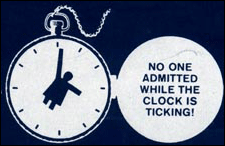
If you listen closely between the two songs on the mp3, you can hear singer Colin Blunstone being quizzed on his pronunciation of ‘Clock’ before beginning the final vocal take:
Unknown: Let’s hear it!
Blunstone: Clarrk!
For some reason, the sasstastic delivery of the line “Otto Preminger… Presents!” in ‘Come on Time ‘ has stuck with me since I first heard it, so when I started seeing Preminger mentioned elsewhere it was the first thing I thought of.
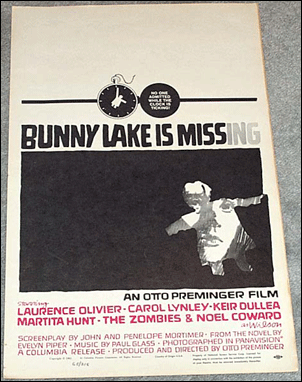
There’s a webpage dedicated to ‘Bunny Lake is Missing’ (“The best movie you’ll never see.”) here. It offers a nice summary of the plot:
“Based on a novel by Marryam Modell (using the pen-name Evelyn Piper), Bunny Lake Is Missing is a rarely seen 1965 thriller directed by the acclaimed Otto Preminger. He was acknowledged as the first “indie” director and worked with sometimes controversial topics. His “Man With The Golden Arm” of 1956 starring Frank Sinatra was the first movie to be given an “X” certificate in the UK due to it’s subject matter of drug use by the main character. Bunny Lake is set in London where an American single mother (played by Carol Lynley) has arrived in town with her daughter. The basic premise of the film (without giving anything away) is that we never see her child (named Bunny Lake), even when she is supposedly dropped off at a nursery school, and when she goes missing we are left in some doubt as to whether she existed to start with. On a desperate search for the child, Lynley’s character comes across some truly weird characters on her travels around a bleak London. Shot entirely in black and white (and apparently less than 100 shots), the movie has a surreal feel to it at times with Preminger’s Hitchcock-like approach adding to the tension. A well-chosen cast including Laurence Olivier, Noel Coward and Keir Dullea strengthen what would otherwise still be a great movie. Olivier’s Police inspector suspects that the mother might not letting him know everything and so the movie builds towards a clever climax. “
The chronology included with the boxset reveals that the Zombies shot for two full days on a soundstage with Preminger. The final cut of the film inludes them for just a few seconds – seen on a television screen in the background, behind actors delivering dialogue. A short description of the scene in question can be found here:
“A British band by the name of The Zombies contributed a few tracks to the movie, one of which features in a way that is hard to describe but I’ll try anyway. Laurence Olivier’s character is standing in a pub talking when for no specific plot reason the camera pans up to a television above the bar where we then watch the band perform a track before the camera pans back to Olivier again. Whether or not this was an early attempt at cross-promotion I don’t know but The Zombies were actually given a “starring” credit on most of the posters for the movie. “
‘Bunny Lake is Missing has never been available on VHS or DVD. If Mr. internet is to be believed it last aired on television sometime in 2000. You can sign up here to be notified by Amazon if it’s ever offered. Also of note is the fact that Resse Witherspoon is actively developing a remake of this movie in which she plans to star. I can’t WAIT to see who takes the place of the Zombies.
Harry Nilsson
For the past year or so I’ve been on a big Harry Nilsson kick. Nilsson is the guy behind ‘The Point,’ the ‘Popeye’ soundtrack, and several other ridiculously great pop songs. It was recently pointed out to me by one Mr. Zachary ‘Jack’ Curd that Nilsson had done a soundtrack in which he sang the credits. Needless to say I had to hear this.
I soon determined that the song came from an Ill-fated 1965 film called ‘Skidoo,’ directed by… Otto Preminger. Looking back at the lyrics to the Zombies song, it seems that Preminger made a habit of getting his films’ credits set to music (If you know of any other examples, please let me know). The really great thing about the Nilsson-penned ‘Cast & Crew’ is that it appears as the OPENING credits and encompasses ALL credits, including such benign information as the film stock, the legal disclaimers, and so on.
Some choice bits of the lyrics:
“Music and Lyrics by nilsson who also played a tower guard…” [Crediting the song to himself within the song! I guess that’s not all that uncommon, actually. Nevermind.]
“Photgraphed in panovision and technicolor…”
“Copyright MCMLXVIII by Sigma productions incorporated, the reciept’s on file…”
“The story, the charcters, and the incidents are fictitious, ho hum, etc. etc…”
If you know of any other instances of the credits to a film being sung, I need to know about it.
In an appropriately bizarre move, Nilsson performed the song live during one of his rare television appearances, on “Playboy After Dark” in 1968. Nilsson had this to say about the song:
“It just happens that in writing that particular thing it was really a lot of work so it stayed with me longer because it was four minutes of peoples’ names and their jobs. So it was trying to write a melody to encompass the names and the jobs to make it come out rhythmically and in rhyme. You know, it was a very difficult thing so you spend a lot of time with it. And I became very familar with the cast and crew of the movie.”
Harry also performed “Good Old Desk” on the show and told Hugh Hefner that the meaning of the song was in its initials – “GOD.” Nilsson later said:
“I bullshitted him. I thought it was funny.”
You can download an MP3 of Nilsson’s ‘The Cast and Crew’ below:
Harry Nilsson – ‘The Cast and Crew’
From: Skidoo / The Point! (2000)
Skidoo was Groucho Marx’s last film (He plays God). It looks as though it’s become a bit of a cult classic in the ‘It’s so bad you have to see it’ sort of way. Skimming the IMDB listing yields this choice user review:
“I went to see this after hearing a lot of hype about how it was one of the most unimaginable oddities in all movie-dom…and anticipation like that can often ruin a movie for you. I had, after all, read all the comments here on IMDB and already knew that Groucho Marx was going to play God, Carol Channing was going to take her clothes off, and Harry Nilsson was going to sing the entire credits. You’d think that the shock of the viewing experience might be compromised by that kind of foreknowledge.”
“But no. Hearing that this movie exists is one thing, but the true surreality of its existence can only really be appreciated once you’ve actually SEEN all these actors actually performing this script, putting in various degrees of professional effort to bring to life the tale of ‘Skidoo.’ The credit song is doubly stunning in that it calls our attention to the names of all the many REAL LIVE PEOPLE who for some reason collaborated to produce this film. To be told that there is a movie in which Austin Pendleton talks Jackie Gleason through an acid trip is merely amusing; but to actually witness Gleason’s bulging eyes as he reacts to a hallucination of Groucho’s head sprouting from a giant screw – for this there is no substitute.”
“Read all the other comments, read anything you can find on this monstrosity, and you’ll still be only half-prepared for what you’re going to see. The only two other films I can think of that so exceeded even their own outrageous hype were Blood Freak and Godmonster of Indian Flats. But, hey, those were low-budget obscurities. Skidoo was a HUGE production – and, unfortunately, I can’t imagine this is EVER going to be released on DVD, VHS, CD, cassette, or eight-track, because I can’t imagine the Preminger estate wanting any trace of Skidoo to surface ever again.”
“Carol Channing in bra and tights. Groucho Marx on a wood screw. Dancing garbage cans. Sure, sure, sure. You’ve heard the stories. But there’s sooooo much more….”
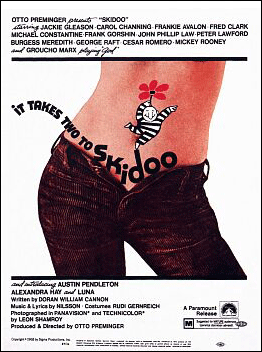
This smoking Gun document, which details the FBI’s efforts to have a reference to the bureau removed from ‘Skiddo,’ describes Preminger as follows:
“Preminger was involved in numerous communist front activities, particularly during the 1940’s. He has been described by informants as having communist sympathies. In 1960, considerable publicity was afforded the fact that he had hired Dalton Trumbo, a screenwriter whose name had appeared on the so-called Hollywood “Black list.”
The rest of the document details Preminger’s refusal to remove the reference:
“Mr. Preminger adamantly said that he would not delete the FBI reference from the sequence and would not substitute other material in lieu of the FBI reference. He said he felt that the FBI should see the humor in the sequence and should not view it as a damaging or ridiculing portrayal.”
“Mr. Preminger said he is aware of the provisions of public law 670, that he has had the law researched, and that he is of the firm belief the public law is not applicable to the present situation. Mr. Preminger suggested he feels so certain that public law 670 does not apply to his portrayal of the FBI in the motion picture “Skidoo” that he would welcome a test of the law in this case if the Department of Justice was so inclined.”
It turns out Preminger was pretty outspoken on fighting censorship (Among other things – on Marilyn Monroe, whom he directed: “A vacuum with nipples.”). Speaking at the Toronto film theatre in 1970, Preminger had this to say on the topic:
“I originally was born in Vienna, and lived there a long time. In the United States, one of the most precious rights we have is the right of free expression. I have had trouble with censorship, with the small movie, THE MOON IS BLUE, because in 1953 people objected to the word “virgin,” which is hard to believe. I could have easily made a few cuts and compromised, but I feel that in our own fields, as motion picture directors, newspapermen, writers, whatever we are, we have not only the right, but the duty to defend this right of free expression; because if this right deteriorates, that is the first step to dictatorship, to totalitarian government, and no totalitarian government, whether on the Right or on the Left, could ever exist with its citizens having the right to speak freely. I think it is very important for us to fight for this right and that is why I have always fought censorship and won. There is no censorship in the United States. I hope it will stay like this. That is my answer to questions about censorship. My views have never changed.”
It looks like you can buy a copy of Skiddo on DVD here ($20), along with all sorts of other rare video, such as a 5 1/2 hour workprint of ‘Apocalypse Now’; The Dirk Diggler Story – a precursor to Boogie Nights filmed by P.T. Anderson at age 17; and… er… Bunny Lake is Missing. So ignore what I said about it not being available anywhere. I don’t feel like going back and revising that paragraph.
Saul Bass
Growing up with an unhealthy interest in neo-surf vinyl, I became well acquainted with the (really, really great) design work of Art Chantry. Chantry was the designer of choice for bands on Estrus records, an early ally of Sci-fi surf monoliths Man… or Astroman?, and he recently released a retrospective of his work titled ‘Some People Can’t Surf.’
You can browse a gallery of his poster design here, and read a great rotodesign interview with him here.
As I learned a bit more about design I also became obsessed with the work of Saul Bass, a graphic designer who was an obvious influence on Chantry.
The font that this version of kempa.com sports is an amalgamation of Bass typography called ‘Hitchcock’ – available in both mac and PC incarnations at saulbass.net. The site is also home to quicktime movies of some of Bass’s best known title sequences and a gallery of his print work. Bass has done posters that probably know without knowing that they’re his work – West Side Story, Alfred Hitchcock’s ‘Vertigo,’ and ‘The Man with the Golden Arm’ (Recently Co-opted by the White Stripes for their ‘Hardest Button to Button’ single) are all good examples. The Man With the Golden Arm is an Otto Preminger film – it turns out Bass worked on several Preminger productions.
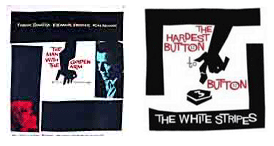
At any rate, one morning about a year ago, I was flipping through a stack of LP’s at a library sale and I found a soundtrack bearing the distinct Saul Bass visual signature. It was for a film called the Cardinal, and I ended up buying the LP just for the cover. A few months later, I ended up ‘borrowing’ the ‘THE’ for a T-shirt design. After scanning the cover and opening the results up in photoshop, I found myself cropping out the name of… Otto Preminger.
There’s a gallery of the posters for Preminger’s films here. It’s interesting to look at how the typographical idea was maintained across languages:

So: The Zombies, Saul Bass, Harry Nilsson, free speech – I suppose Otto Preminger is the human embodiment of a convergence of my tastes. I always sucked at writing conclusions.
This might be old news to everyone, but there’s a really great flash video of someone constructing a song using only windows sound recorder and the default windows sound effects. It’s fairly long and really starts to evolve in a great way about halfway through. The cynic in me doesn’t believe it was done in realtime, but it’s put together pretty well. The site I link to is just a mirror – anyone know where it came from?
